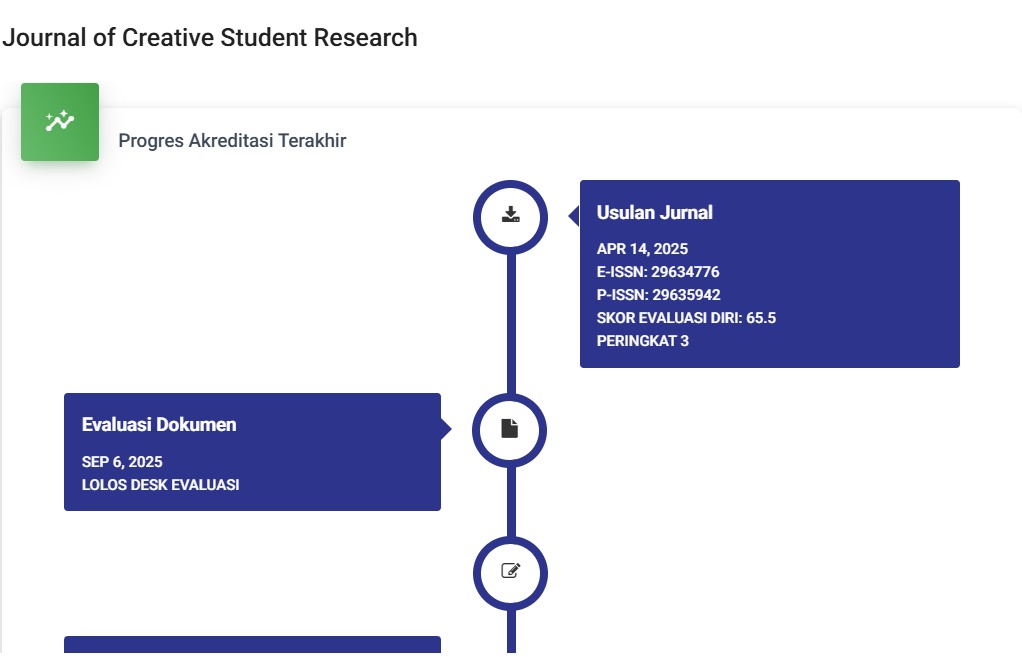Analisis Kesulitan Belajar Siswa pada Pembelajaran Online MTS Negeri 1 Kolaka
DOI:
https://doi.org/10.55606/jcsrpolitama.v1i4.2248Keywords:
Learning difficulties, Online LearningAbstract
The COVID-19 pandemic that has occurred throughout the world, including Indonesia, has greatly impacted teaching and learning activities in schools. The learning process that is usually done face-to-face has now turned into online learning, this underlies the emergence of learning difficulties in students. This problem is the background of this research which will see how the difficulties of students in online learning. This study aims to determine student learning difficulties in the online learning process during the covid-19 pandemic in class VIII at MTs Negeri 1 Kolaka. The type of research used in this research is descriptive qualitative research. The number of samples used were 50 students of class VIII MTs 1 Kolaka taken by random sampling technique. The instrument used in this study is a questionnaire with a total of 20 statement items. Students' learning difficulties can be seen from 3 indicators, namely technical difficulties, implementation of learning and difficulties of external factors. The results of this study indicate that the technical difficulty indicator is 36% in the "very high" category. Indicators of learning implementation 38% in the "medium" category. The external factor difficulty indicator is 40% in the “high” category. Overall the average. of the questionnaire data obtained was 58.22% with the highest percentage of 40% being in the "medium" category. Based on the results of the analysis, it can be concluded that learning difficulties in online learning are moderate.
Downloads
References
Ahmad, S. A. H., & Azizzatun, N. (2022). Penggunaan Aplikasi Whatsapp pada Pembelajaran Online di Kelas V MIN 9 Banjar. Jurnal of Islamic Edukacion, 1(2)
Dabbagh, N., & Bannan, B. (2005). Online Learning Concepts, Strategis and Application. Person Education.
Daniatia, N. A. (2015). Hubungan Antara Kemampuan Verval, Kemampuan Interpersonal, dan Minat Belajar dengan Prestasi Matematika Pythagoras: Jurnal Pendidikan Matematika,10(1), 50-60.
Eti, M. Y. (2015). Kesulitan Belajar Matematika di Sekolah Dasar. Jurnal Jupendes.2(2): 2355-3650
Firman & Sari, R., R. (2020). Pembelajaran Online di Tengah Pandemi Covid-19. Jurnal Indonesia Journal of Educational Science (IJES). 2(2): 2622
Hallen, A. (2002). Bimbingan Konseling Dalam Islam. Jakart: Ciputat Pers
Handarini, O., I. (2020). Pembelajaran Daring Sebagai Upaya Study Home (SFH) Selama Pandemi Covid-19. Jurnal Pendidikan Administrasi Perkantoran (JPAP). 8(3).
Irham, M. & Wiyani, N. A. (2013). Psikologi Pendidikan: Teori dan Aplikasi Dalam Proses Pembelajaran, Yogyakarta: ar-ruzz Media
Luh, D. H., Nurhasanah., Maria, E. S., & Heru, K. (2020). Pembelajaran Pada Masa Pandemi Covid-19. Jurnal Teknologi Pendidikan. 22(1): 2620-3081.
Mulyadi. (2010). Diagnosis Keulitan Belajar & Bimbingan Kesulitan Belajar Khusus. Yogyakarta. Nuha Litera
Novianti, R., Puspitasari, E., & Maria, I. (2020). Parents’ Involmevemen In Children’s Learning Activities During The Covid-19 Pandemic. Jurnal Fundadikdas (Fundamental Pendidikan Dasar), 1(1), 74
Prihati, M. Satri. (2017). Pengaruh Fasilitas Belajar, Gaya Belajar dan Minat Belajar Terhadap Hasil Belajar Mata Pelajaran Ekonomi Siswa kelas X ISS SMA Negeri 1 Seyengan. Jurnal Pendidikan dan Ekonomi, 6(5), 443-452.
Ricardo, & Meilani, R. I. (2017). Impak Minat dan Motivasi Belajar Terhadap Hasil Belajar Siswa. Jurnal Pendidikan Manajemen Perkantoran, 2(2)
Rigianti, dan Hendry, A. (2020). Kendala Pembelajaran Daring Guru Sekolah Dasar di Kabupaten Banjanegara. Jurnal Elementary School.297-302
Sadikin, A., dkk. (2020). Pembelajaran Daring di Tengah Wabah Covid-19 (Online Learning in the Middle of the Covid-19 Pandemic). 6(1), 214-224
Sinerja & Awaludin. (2021). Analisis Kesulitan Pembelajaran Daring Dengan Whatsapp. Jurnal MathEducation Nusantara. 4(2), 24-32
Waryanto. (2016). Online Learning Salah Satu Inovasi Pemelajaran. Phytagoras, 10-23.
Sudjidno, A. (2011). Pengantar Evaluasi Pendidikan. Jakarta: PT Raja Drafindo Persada
Valesa, Alsi R. (2017). Peran Orang Tua dalam MeningkatkanPrestasi Anakdi Perum Tanjung Raya Permai Kelurahan Pematang Wangi Kecamatan Tanjung Senang Bandar Lampung.Skripsi: UINRaden Intan Lampung
Yuliza, P. U., & Derius, A. D. C. (2020). Study at Home: Analisis Kesulitan belajar Matematika Pada Proses Pembelajaran Daring. Jurnal Ilmiah Matematika Realistik. 1(1): 20-2.








